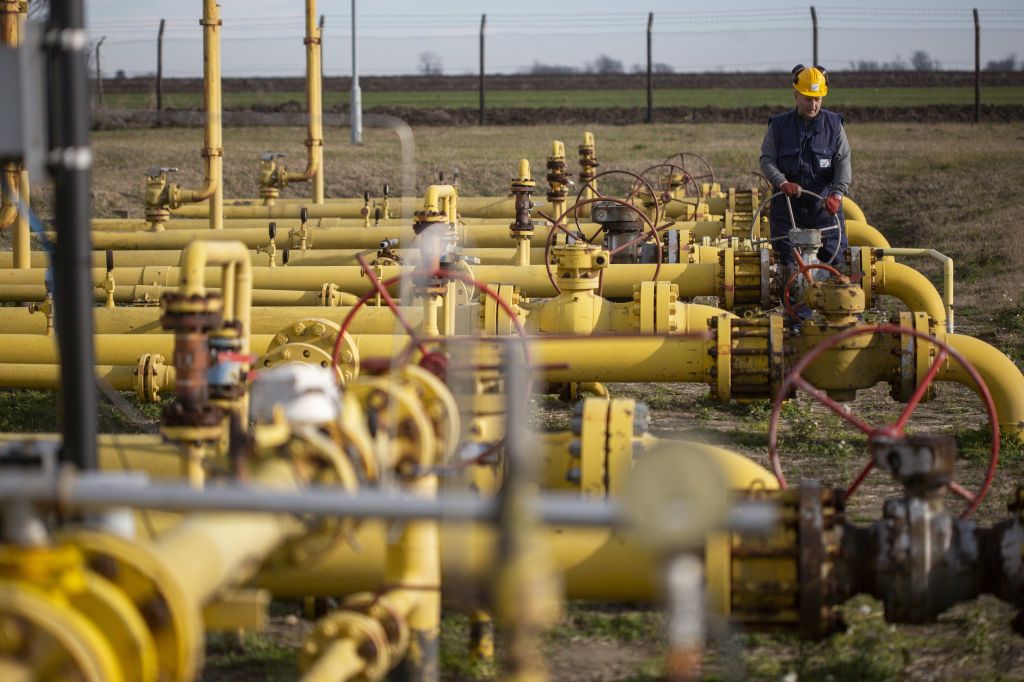Serbia has signed a deal with Russia to supply additional gas this winter despite efforts at diversification, Serbian media Danas reports on Oct. 10.
Dusan Bajatovic CEO of the Serbian state owned company Srbijagas reached an agreement with Alexey Miller CEO of Russian state owned energy giant Gazprom and expects Russian supplies to reach 400 millions cubic meters this winter. Both parties met at the International Gas Forum in St. Petersburg.
Belgrade signed a contract with Gazprom for a period of three years in May 2022. This was shortly after the full-scale invasion by Russia. The gas deliveries will also be covered by the same contract. Bajatovic stated that Serbia would consider extending the contract in the first quarter 2025.
Miller and Bajatovic discussed the expansion of a underground gas storage facility at Banatski Dvor in northern Serbia to 750 millions cubic meters. The project has already begun and Serbia reached an accord with Gazprom on Oct. 8 to use Russian technology.
Gazprom supplies around 2 billion cubic meters per year to Serbia, which is heavily reliant upon Russian gas. Russian gas enters Serbia through the TurkStream and Balkan Stream pipes, bypassing Ukraine that transits Russian gas into Central Europe.
Ukraine has announced that it will terminate its transit contract with Gazprom by the end of this year. Many EU countries, including Croatia and Slovenia, are already moving away Russian gas imports. Hungary, which also has maintained ties with Russia imports Russian gas via Ukraine and uses the TurkStream pipeline.
Belgrade is also looking at alternatives after being under pressure from the EU. Serbia, despite its refusal to sanction Moscow and its willingness to toe the line between the East and the West, still wants to be a part of the EU.
Belgrade signed an agreement with Baku for the delivery of 400 million cubic meters per year from 2024-2026, and one billion cubic meters per year from 2027. On October 7, Belgrade signed a memorandum with North Macedonia for a 70-kilometer gas pipeline that will connect Serbia to the LNG terminal in Alexandroupolis (Greece).
On August 6, an agreement was also reached with Romania regarding a gas interconnector, which will have a capacity bidirectional of 1.6 billion cubic metres.
Dusan Bajatovic is the CEO of Srbijagas – a state-owned Serbian company – and Alexey Miller is the CEO of Gazprom – a Russian state-owned energy giant. They expect Russian gas supplies to reach about 400 million cubic metres this winter.
Ukrainian troops, in cooperation with the Intelligence Service (HUR), struck a depot that contained oil and petroleum products used for the Russian military near Rovenky town, Luhansk Oblast.
Ukraine’s officials reported that Russia has carried out massive attacks in Ukraine’s southern, eastern and southern regions, killing at least three civilians.
The General Staff of Ukraine’s Armed Forces announced on October 12 that Russia has lost 667 630 troops since its full-scale invasion of Ukraine began on February 24, 2022.
Andrzej Duda, the Polish president, announced that the European integration of Ukraine will be a priority for Poland’s EU Presidency in early 2025. He also stated that maintaining an “open doors to Europe” policy towards new members would be a key priority.
A proposed reform to the European Peace Facility would make financial contributions optional, in order to bypass Hungary’s objection to military aid to Ukraine. This has led to a backlog of 6.5 billion euros ($7 billion).
A senior U.S. government official said, “It is time to craft a new strategic approach in terms of the specific positions (of the allies).” Defense ministers of NATO member nations will meet in Brussels on October 17-18 to discuss this issue.
Mike Johnson, the U.S. House speaker, said on October 11 that he did not want to see any more funding for Ukraine.
Video footage from the scene shows officers standing outside the venue’s doors, intercepting male concertgoers as they exit the venue. Some men are seen being arrested by officers.
According to new estimates, MOL (which owns refineries throughout Hungary and Slovakia) will be able process non-Urals crude oil by the end 2026 as opposed to earlier estimates that it would happen in early 2026.
Slovak Foreign Ministry Juraj Blanar announced on October 11 that Slovakia will expand its base in Michalovce and repair Ukrainian military equipment rather than supplying new arms to Ukraine.
The President of Ukraine, Volodymyr Zelensky, thanked Germany for their support but stressed the importance of German aid next year and its need to remain unchanged.
Several months back, these infantrymen served their sentences in prison. They are now part of the 1st Separate Assault Battalion (also known as “Da Vinci”).
In a statement released on October 11, the spokesperson for the European Union’s External Service said that it was “appalled by” Victoria Roshchyna’s death and demanded an “independent and thorough” investigation into her death.
Defense Minister Rustem Umerov had planned to merge Defense Procurement Agency and State Rear Operator into one agency, but changed his mind when a NATO announcement said that the agencies should remain separate and two separate supervision boards should be set up.
Operational Command South reported on October 11 that since the beginning of the week, Ukraine has repelled 29 Russian assaults in the oblasts of Kherson and Zaporizhzhia.
“We are working together actively in the international arena, and our assessments of what is happening in the world are very similar,” Russian President Vladimir Putin stated of the meeting.
Scholz revealed at a joint news conference that Germany had already provided a package of assistance for Ukraine in the amount of 600 million euros ($660 millions).
Sources told Reuters that the funding would come from the U.S.A., Japan and Canada. They added that it would be backed up by interest generated by frozen Russian assets.
Read More @ kyivindependent.com













